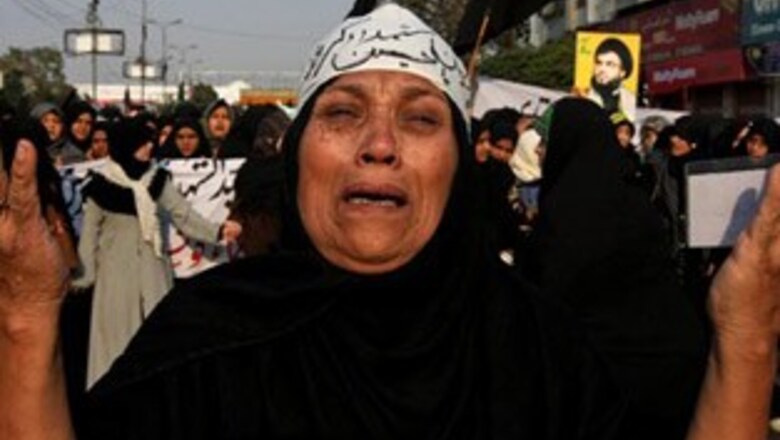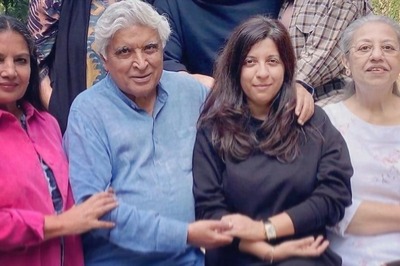
views
Karachi: A suspected suicide bomber on a motorcycle killed 12 Shi'ites in Pakistan's commercial capital on Friday, followed hours later by a blast at a hospital where the wounded were being treated which killed as many as 10 people.
The violence is bound to raise further questions about the effectiveness of security crackdowns on resilient al Qaeda-backed Taliban militants at a time when Washington is pushing Pakistan to help stabilise neighbouring Afghanistan.
In scenes that have become familiar in the state's battle with the Taliban, the second blast sent a plume of white smoke above Jinnah Hospital as distraught Pakistanis transported dead relatives. The blast blew clothes and sandals off bodies near ambulances.
A teenage girl wept over what appeared to be a female relative whose stomach was shredded by shrapnel. "It (the explosion) happened right in the middle of ambulances," Reuters reporter Augustine Anthony said of the second blast. A senior police official told Reuters that several hundred people were present.
The Pakistani Taliban have carried out waves of bombings at crowded markets and army and police facilities, killing hundreds of people since October in a bid to topple the pro-American government of unpopular President Asif Ali Zardari.
Carnage in the home of Pakistan's stock exchange and main port could further discourage investors, who have watched the Taliban spread their violent campaign from strongholds in lawless areas near the Afghan border to major cities, including an attack on a mosque near the headquarters of the powerful military.
The violence shook Karachi at a time when questions are being asked about the fate of Pakistan Taliban leader Hakimullah Meshud, who was wounded after a US drone aircraft strike in the northwest of the country in December.
His appearance in a farewell video with the double agent suicide bomber who killed seven CIA agents in Afghanistan in December suggested Zardari's pro-American government now faces a more sophisticated enemy capable of striking outside the country.
MISSING BROTHERS
The attacks had all the trademarks of Taliban operations. Raja Umer Khattab, a senior police officer, said initial investigations suggested an al Qaeda-linked group was responsible.
"I came here with my two brothers to see our ailing cousin. Now they are missing. I don't know where they are," Meena, a 10-year-old girl, told a television station reporter at the hospital. Karachi has been largely free of Islamist violence over the past couple of years, but a bomb at a minority Shi'ite Muslim procession in late December fuelled concern that the militants were expanding their fight to the city.
Sustained violence in Karachi, which has recently witnessed heightened political tension, could further dampen investor confidence in the sluggish economy. "A motorcyclist exploded near a bus ahead of us. We took off and rescued wounded," a witness to the first explosion said. About 40 people were wounded. "It's cruel.
They are not Muslims. They are not human. The government is responsible because it has failed to provide us security and control terrorists." Dozens of enraged Shi'ites gathered at the scene of the blast. Some scuffled with police.
Others wept and embraced. "They have damaged vehicles, smashed hospital doors and window. There must be deaths and wounded but we don't know exactly. it's panic," said Kamran Samuel, a hospital employee, told Reuters by telephone. On Wednesday, the al Qaeda-backed Taliban claimed responsibility for a high-profile bomb attack that killed three U.S. Special Operations soldiers near a girls' school in northwest Pakistan, and threatened more attacks on Americans.####


















Comments
0 comment